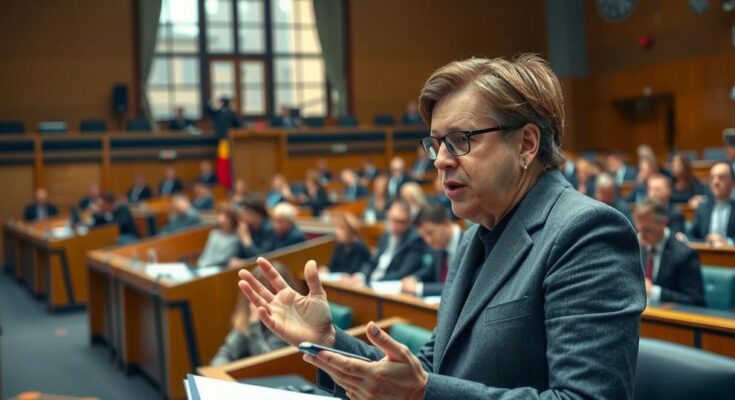Chancellor Scholz seeks bipartisan support for key legislation before upcoming snap elections. He emphasized tax reforms, child welfare enhancements, and continuation of the Deutschlandticket as priorities. In addition, he reaffirmed support for Ukraine while aiming to navigate his party’s decline ahead of anticipated elections in February.
In a recent session with the Bundestag, German Chancellor Olaf Scholz sought bipartisan support to pass crucial legislation prior to anticipated snap elections. With a vote of confidence on the horizon, Scholz emphasized the importance of action during the campaign period, urging opposition leaders to collaborate on key bills aimed at alleviating financial burdens for citizens. These bills include restructured tax brackets to mitigate the effects of inflation, enhancements to child welfare payments, and the continuation of the discounted nationwide rail pass known as the “Deutschlandticket.”
Scholz also reported on his recent diplomatic visit to Kyiv, affirming Germany’s ongoing support for Ukraine amidst the war while advocating for constructive dialogue towards its resolution. He highlighted the need for such discussions to involve Ukrainian officials and cautioned against military escalations, specifically regarding the potential provision of long-range Taurus missiles. Additionally, he acknowledged the needs of Ukrainian refugees in Germany and their desire for employment opportunities, following a request from Ukrainian President Volodymyr Zelenskyy.
During this interaction, Scholz reiterated his ambitions to lead his party through the upcoming elections, despite significant challenges posed by current polling numbers. With reports indicating that the Coalition parties, particularly the SPD, are trailing behind opposition parties, Scholz expressed determination to seek a revival in support, insisting, “I also want to be my own successor.” This reflection marks a pivotal moment in German political history as Scholz navigates his governance amidst a shifting electoral landscape.
The German political landscape has recently been dynamic, marked by a decline in Chancellor Olaf Scholz’s SPD party, which faces declining public support ahead of snap elections set for February. Scholz’s need to secure support from opposition parties highlights the complexities of governance with a minority government. The impending vote of confidence underscores the volatility of his administration, exacerbated by the withdrawal of coalition support following the dismissal of a key finance minister. Furthermore, the ongoing conflict in Ukraine and its ramifications for Germany’s foreign policy are of paramount importance, influencing both legislative initiatives and public sentiment.
In summary, Chancellor Olaf Scholz is actively seeking collaboration from opposition parties to pass essential legislation that aims to reduce financial pressures on citizens before the upcoming elections. His diplomatic commitments to Ukraine further illustrate Germany’s role on the international stage during ongoing conflicts. Scholz’s ambition to maintain leadership within a declining SPD party amid electoral challenges reflects his strategic approach to governance as he faces a significant political moment in Germany.
Original Source: www.dw.com




